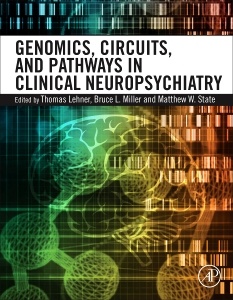Genomics, Circuits, and Pathways in Clinical Neuropsychiatry
Coordonnateurs : Lehner Thomas, Miller Bruce L., State Matthew W.

This foundational work comprehensively examines the current state of the genetics, genomics and brain circuitry of psychiatric and neurological disorders. It consolidates discoveries of specific genes and genomic regions associated with these conditions, the genetic and anatomic architecture of these syndromes, and addresses how recent advances in genomics are leading to a reappraisal of the biology underlying clinical neuroscience. In doing so, it critically examines the promise and limitations of these discoveries toward treatment, and to the interdisciplinary nature of understanding brain and behavior. Coverage includes new discoveries regarding autism, epilepsy, intellectual disability, dementias, movement disorders, language impairment, disorders of attention, schizophrenia, and bipolar disorder. Genomics, Circuits, and Pathways in Clinical Neuropsychiatry focuses on key concepts, challenges, findings, and methods in genetics, genomics, molecular pathways, brain circuitry, and related neurobiology of neurologic and psychiatric disorders.
Section 1 The Genome Tools and Methods
1. The Newly Emerging View of the Genome
Stephan Sanders
2. Genetic Epidmeiology
Kathleen Ries Merikangas
3. Common Variation
Mark Daly
4. Rare/Structural Variation
Daniel Barrera and Jonathan Sebat
5. Epigenetics and Epigenomics
Eric J. Nestler and John Greally
6. Bioinformatics
Shaun Purcell
7. Imaging Genomics
Paul Matthew Thompson
8. Stem Cell Technology and Genomics
Alysson Renato Muotri
9. Association Strategies
Benjamin M. Neale
10. The promise of Systems Biology
Eric Schadt
11. Gene networks in neuropsychiatric disease
Daniel Geschwind
12. Mosaicism
Christopher A. Walsh and Saumya Shekhar Jamuar
Section 2 A new neuroanatomy
13. Mapping the Molecular Landscape of the Human Brain
Nenad Sestan
14. Studying Circuits
Stephan Lammel and Robert Malenka
15. Electrophysiological Measurement of Circuits
Srikantan S. Nagarajan
16. Imaging the Circuitry of the Human Brain
Michael Greicius
17. Neuroimaging Advances in Alzheimer’s Disease
Daniel R. Schonhaut and Gil Rabinovici
18. Progressive Supranuclear Palsy and Related Parkinsonian Disorders
Jesse A. Brown and William Seeley
19. The Anatomy of Basal Ganglia Circuitry of Behavior
Nicholas Au Yong, Adrienne M. Keener, Yvette Bordelon, Carlos Portera-Cailliau and Nader Pouratian
20. Brainstem Circuitry of Behavior
Helmut Heisen
21. Apathy – Basal Ganglia, Frontal Circuits
Mario F. Mendez
22. Emotion Circuitry
Robert Wayne Levenson
23. Delusions
Georges Naasan
24. Hallucinations
Dennis Velakoulis
Section 3 Clinical Phenomenology
25. Intro: Risk Overlap Among Disorders
Patrick Sullivan
26. The conundrum of Clinical Characterization RDOC/ICD-10/DSM
Bruce N. Cuthbert
27. Schizophrenia
Aiden Corvin
28. Psychosis
Raquel E. Gur and Ruben Gur
29. ASD
Rebecca Ann Muhle, Stephan Sanders, Hannah Reed and Matthew William State
30. Bipolar Disorder
Nelson B. Freimer, Carrie E. Bearden and Peter Zandi
31. MDD
David C. Glahn
32. Speech and Language Disorders
Marilu Gorno-Tempini
33. Molecular Pathways Leading to the Clinical Phenomenology of Frontotemporal Dementia
Suzee Eurie Lee and Jennifer S. Yokoyama
34. Alzheimer’s
Rudy Tanzi
35. PTSD
Kerry Ressler
36. Neurodevelopmental syndromes
Elliott Sherr
37. Epilepsies
Ryan S. Dhindsa, Daniel Lowenstein and David Goldstein
38. Substance Abuse
Nii Addy
39. Neuroimmunology
Emmanuel Mignot
40. Brain Tumors
Vanessa Clark and Murat Günel
41. White Matter Disorders
Michael David Geschwind and Brianne Magouirk Bettcher
42. ALS
Elena Ratti and James Berry
43. Eating Disorders
Cynthia M. Bulik and Garret Stuber
Section 4 Clinical Translation and Drug Development
44. Pharmacogenomics
Roy H. Perlis
Dr. Miller holds the A.W. and Mary Margaret Clausen Distinguished Professorship in Neurology at the University of California, San Francisco (UCSF). He directs the busy UCSF dementia center where patients in the San Francisco Bay Area and beyond receive comprehensive clinical evaluations. His goal is the delivery of model care to all of the patients who enter the clinical and research programs at the UCSF Memory and Aging Center (MAC).
Dr. Miller is a behavioral neurologist focused on dementia with special interests in brain and behavior relationships as well as the genetic and molecular underpinnings of disease. His work in frontotemporal dementia (FTD) emphasizes both the behavioral and emotional deficits that characterize these patients, while simultaneously noting the visual creativity that can emerge in the setting of FTD. He is the principal investigator of the NIH-sponsored Alzheimer’s Disease Research Center (ADRC) and program project on FTD called Frontotemporal Dementia: Genes, Imaging and
- Provides interdisciplinary appeal in psychiatry, neurology, neuroscience, and genetics
- Identifies key concepts, methods, and findings
- Includes coverage of multiple disorders from autism to schizophrenia
- Reviews specific genes associated with disorders
- Discusses the genetic architecture of these syndromes
- Explains how recent findings are influencing the understanding of biology
- Clarifies the promise of these findings for future treatment
Date de parution : 06-2016
Ouvrage de 796 p.
21.4x27.6 cm



